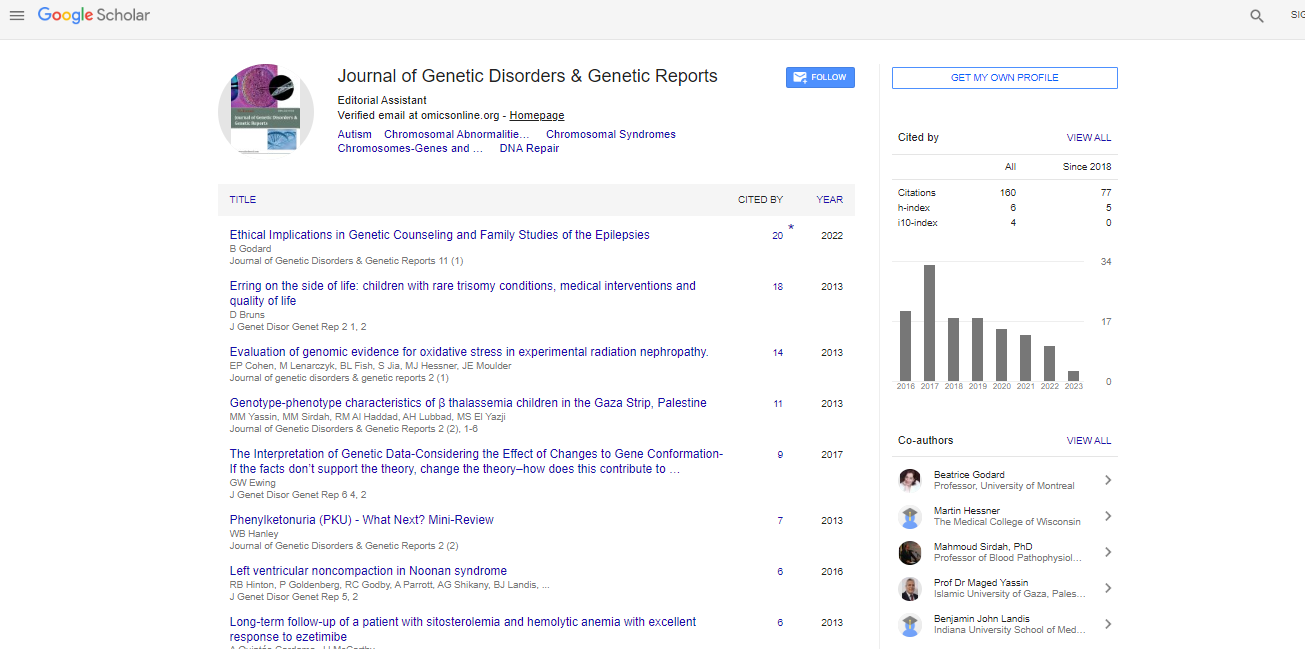Commentary, J Genet Disor Genet Rep Vol: 12 Issue: 4
Advancements in Genomic Sequencing Technologies: Implications for Genetic Diagnosis
Laura Hailden*
1Division of Gene Regulation, The Netherlands Cancer Institute, Amsterdam, The Netherlands
*Corresponding Author: Laura Hailden,
Division of Gene Regulation, The
Netherlands Cancer Institute, Amsterdam, The Netherlands
E-mail: hailden_laura2@gmail.com
Received date: 25 July, 2023, Manuscript No. JGDGR-23-113879;
Editor assigned date: 28 July, 2023, PreQC No JGDGR-23-113879(PQ);
Reviewed date: 11 August, 2023, QC No JGDGR-23-113879;
Revised date: 21 August, 2023, Manuscript No JGDGR-23-113879(R);
Published date: 28 August, 2023, DOI: 10.4172/2576-1439.1000214.
Citation: Hailden L (2023) Advancements in Genomic Sequencing Technologies:Implications for Genetic Diagnosis. Int J Genet Disor Genet Rep 12:4.
Abstract
Description
Genomic sequencing technologies have witnessed extraordinary progress over the past few decades, significantly impacting the field of genetic diagnosis. The recent advancements in genomic sequencing technologies and their profound implications for genetic diagnosis, clinical applications, and personalized medicine.
The study of genetic disorders has long relied on the ability to sequence and analyze an individual's genome. Traditional Sanger sequencing, though groundbreaking, was slow and costly. However, the emergence of Next-Generation Sequencing (NGS) technologies marked a pivotal moment in genetics, enabling faster, more costeffective sequencing, and expanding understanding of genetic diseases.
Advancements in genomic sequencing technologies
Next-Generation Sequencing (NGS): NGS technologies, such as Illumina's HiSeq and NovaSeq platforms, have revolutionized genetic diagnosis. High-throughput sequencing allows the parallel processing of numerous Deoxyribonucleic acid (DNA) fragments, reducing the time and cost of sequencing. NGS has become the standard in clinical diagnostics for a wide range of genetic disorders, including monogenic diseases, complex diseases, and somatic mutations in cancer.
Third-Generation Sequencing (TGS): TGS platforms, like Pacific Biosciences (PacBio) and Oxford Nanopore Technologies (ONT), offer long-read sequencing capabilities. TGS technologies provide more accurate reconstructions of complex genomic regions, including structural variations, repeat expansions, and haplotypes. These technologies are particularly valuable in diagnosing rare genetic diseases and identifying elusive pathogenic variants.
Single-cell sequencing: Single-cell Ribonucleic Acid sequencing (scRNA-seq) and single-cell Deoxyribonucleic Acid sequencing (scDNA-seq) have emerged as transformative tools. scRNA-seq reveals cellular heterogeneity within tissues and tumors, aiding in understanding genetic mosaicism and disease progression. scDNA-seq enables the study of genomic variations at the single-cell level, offering insights into tumor evolution and the clonal architecture of cancers.
Implications for genetic diagnosis
Enhanced diagnostic accuracy: High-resolution sequencing technologies improve the accuracy of genetic diagnosis by detecting pathogenic mutations with greater precision. The identification of rare and novel genetic variants becomes more feasible, leading to more accurate diagnoses.
Rare disease diagnosis: NGS and TGS have transformed the diagnosis of rare genetic disorders, reducing the diagnostic odyssey that patients often face. Rapid diagnosis aids in the initiation of timely interventions, including personalized treatment plans.
Cancer genomics: Genomic sequencing plays a pivotal role in cancer diagnosis, treatment, and monitoring. It enables the identification of driver mutations, prediction of treatment responses, and tracking of tumor evolution and resistance.
Pharmacogenomics: Personalized medicine benefits from genomic sequencing by tailoring drug choices and dosages to an individual's genetic profile. This minimizes adverse drug reactions and enhances the efficacy of therapeutic interventions.
Data analysis and interpretation: Handling the massive amount of data generated by high-throughput sequencing requires advanced bioinformatics tools and expertise. Accurate variant interpretation remains challenging, particularly for variants of unknown significance.
Cost and accessibility: Although costs have decreased significantly, genomic sequencing can still be expensive, limiting access for some individuals and healthcare systems. Strategies to ensure equitable access to these technologies are essential.
Ethical considerations
Privacy and informed consent: Safeguarding the privacy of individuals' genetic data is paramount. Robust informed consent processes are necessary to ensure individuals understand the implications of genetic testing and data sharing.
Genetic discrimination: Concerns about genetic discrimination in employment and insurance highlight the need for legal protections against the misuse of genetic information.
Conclusion
Advancements in genomic sequencing technologies have shown in a new era of genetic diagnosis, clinical practice, and personalized medicine. These technologies have enhanced diagnostic accuracy, accelerated the diagnosis of rare diseases, improved cancer management, and optimized pharmacological interventions. However, challenges in data analysis, cost, and ethical considerations must be addressed to fully harness the potential of genomic sequencing in healthcare. With ongoing research, technological innovations, and ethical safeguards, genomic sequencing a brighter future for individuals affected by genetic disorders and a transformative impact on the practice of medicine as a whole.
 Spanish
Spanish  Chinese
Chinese  Russian
Russian  German
German  French
French  Japanese
Japanese  Portuguese
Portuguese  Hindi
Hindi 



